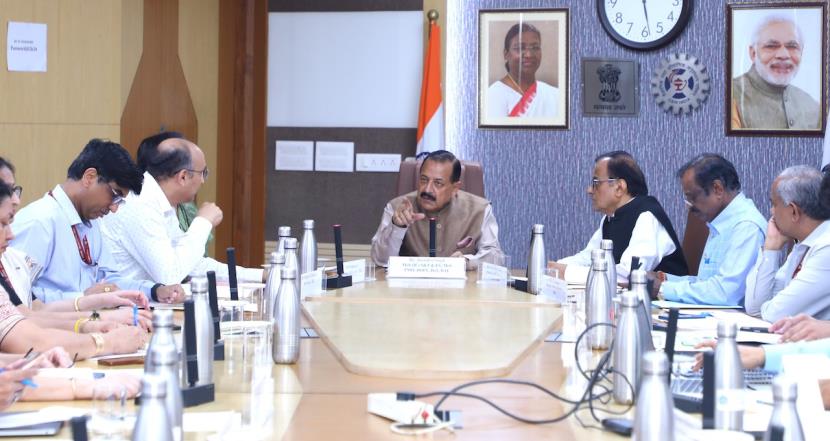India to develop 'E-Hansa' next-generation two-seater electric Aircraft: Dr Jitendra

May 27, 2025
NEW DELHI: India has initiated the process to develop Electric Hansa (E-Hansa), a next-generation two-seater electric trainer Aircraft.
This was disclosed here today by Dr Jitendra Singh, Union Minister of State (Independent Charge) for Science & Technology, Dr. Jitendra Singh while chairing a high-level monthly review meeting with the secretaries of all major science departments at the Science Centre here.
In his capacity as Vice President of CSIR (Council of Scientific & Industrial Research), Dr Jitendra Singh said, it is a matter of pride that the new aircraft is being indigenously developed by the CSIR institute of "National Aerospace Laboratories" (NAL) Bengaluru.
The Electric Hansa (E-HANSA) trainer aircraft, developed by CSIR-NAL, is expected to cost significantly less than imported alternatives, possibly around Rs 2 crore . This is roughly half the price of a comparable imported trainer aircraft.
The E-HANSA is part of the larger HANSA-3 (NG) trainer aircraft program, which is designed to be a cost-effective and indigenous option for pilot training in India.
India's E-Hansa aircraft will also mark a key step toward India's green aviation goals and use of green or clean energy fuel in running our aircrafts, said the Minister.
Further, the meeting focused on performance assessment, implementation status of prior decisions, and setting the course for transformative reforms in India's science and technology ecosystem.
Stressing the need for commercialization of indigenous technologies, Dr. Jitendra Singh called for greater public-private partnerships (PPP). He directed the National Research Development Corporation (NRDC) to emulate the successful models of DBT-BIRAC and IN-SPACe for technology transfer and private sector engagement.
Dr. Jitendra Singh, Union Minister of State (Independent Charge) for Science and Technology, Minister of State (Independent Charge) for Earth Sciences, MoS PMO, Department of Atomic Energy and Department of Space, MoS Personnel, Public Grievances and Pensions said "Private players should not just be knowledge partners, but also investment partners," advocating a hub-and-spoke PPP model supported by AI-driven tech/IP exchange platforms and regional NTTOs to ensure wider sectoral and geographic outreach.
Dr. Jitendra Singh reiterated the importance of standardized tech transfer protocols, ease of doing business, and promoting Indian R&D under the ethos of "Vasudhaiva Kutumbakam".
Commending ISRO for the successful SPADEX mission, he noted that the docking and undocking capability tested is vital to India's upcoming Gaganyaan human spaceflight. He also lauded ISRO's substantial role in Operation Sindoor, stating, "Every Indian is proud of you." He shared that ISRO is currently collaborating with 40 Union Ministries and 28 State Governments, with a series of upcoming missions lined up.
Regarding India's contribution to the Axiom Space Mission, Dr. Jitendra Singh informed that Group Captain Subhash Shukla's visit to the International Space Station (ISS) will include seven microgravity experiments, further boosting India's space science profile.
In alignment with Prime Minister Narendra Narendra Modi's ‘Viksit Bharat' vision, Dr. Jitendra Singh emphasized a Whole-of-Science and Whole-of-Government approach. Following the success of the Chintan Shivir organized by the Ministry of Earth Sciences in NIOT, Chennai, he directed that region-wise Chintan Shivirs be organized across the country. These will include DST, DBT, CSIR, ISRO, Earth Sciences, and Atomic Energy departments in each region to promote integrated planning and synergy.
To strengthen India's biomanufacturing capabilities, the Minister proposed the creation of a "Global Science Talent Bridge" to attract the best global researchers and innovators. Highlighting the PM's Mann Ki Baat announcement that opened all 37 CSIR labs to students, he shared that an enthusiastic response had to be temporarily paused due to recent security concerns but would resume soon.
Dr. Jitendra Singh also acknowledged global interest in setting up bilateral science collaboration centres, with countries like Switzerland and Italy exploring partnerships similar to the Indo-French and Indo-German Science Centres.
The meeting was attended by prominent officials including Prof. Ajay Kumar Sood, Principal Scientific Advisor to the Government of India; Dr. N. Kalaiselvi, DG and Secretary CSIR; Dr. V. Narayanan, Chairman ISRO and Secretary DoS; Dr. Abhay Karandikar, Secretary DST; Dr. Rajesh Gokhale, Secretary DBT; Dr. M. Ravichandran, Secretary Earth Sciences; Dr. M. Mohapatra, DG IMD; and Commodore Amit Rastogi (Retd), CMD NRDC, along with senior officials from the Department of Atomic Energy.